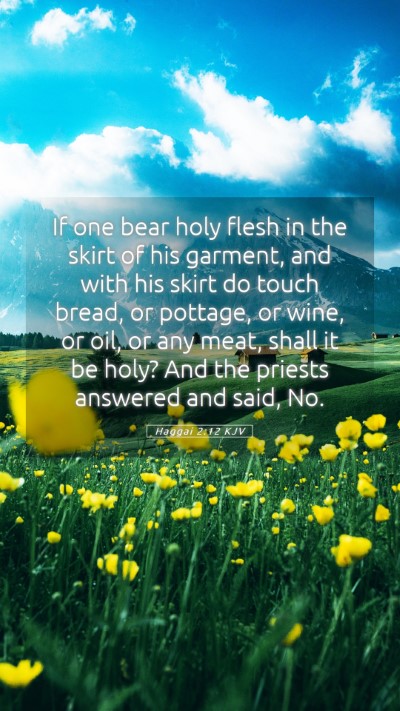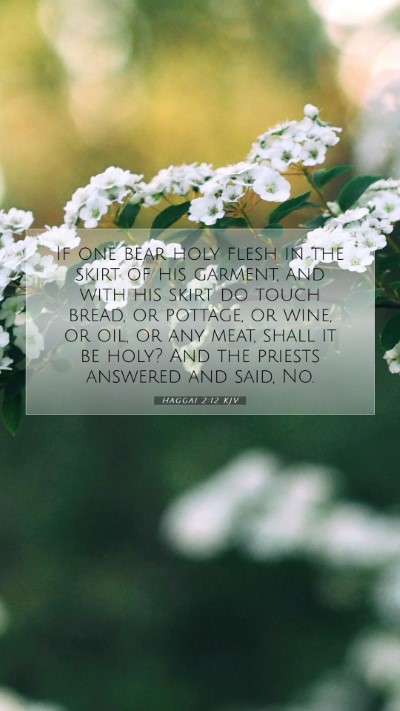Old Testament
Genesis Exodus Leviticus Numbers Deuteronomy Joshua Judges Ruth 1 Samuel 2 Samuel 1 Kings 2 Kings 1 Chronicles 2 Chronicles Ezra Nehemiah Esther Job Psalms Proverbs Ecclesiastes Song of Solomon Isaiah Jeremiah Lamentations Ezekiel Daniel Hosea Joel Amos Obadiah Jonah Micah Nahum Habakkuk Zephaniah Haggai Zechariah MalachiHaggai 2:12 Meaning
What is the meaning of Haggai 2:12?
If one bear holy flesh in the skirt of his garment, and with his skirt do touch bread, or pottage, or wine, or oil, or any meat, shall it be holy? And the priests answered and said, No.
Haggai 2:12 Bible Verse Meaning
Understanding Haggai 2:12 - Meaning and Exegesis
Haggai 2:12 states: "If one carries holy meat in the fold of his garment, and touches with his fold bread or pottage, or wine, or oil, or any meat, shall it be holy? And the priests answered and said, No."
This verse challenges conventional ideas about holiness and contamination, drawing upon the Levitical laws that governed purity in ancient Israel. Prominent commentaries such as those by Matthew Henry, Albert Barnes, and Adam Clarke provide rich insights into the implications of this scripture.
Verse Interpretation and Commentary
This passage can be examined through various lenses:
- Holiness and Its Transmission: The verse poses a rhetorical question regarding the transmission of holiness. Matthew Henry emphasizes that holiness is not automatically passed from one object to another, unlike corruption or uncleanliness, which can easily spread.
- Understanding Scripture within Context: Adam Clarke notes that the cultural context of the Israelites under the Mosaic Law is essential for understanding this verse. It reflects their understanding of ceremonial purity and the significance attributed to sacred objects.
- Priestly Duties and Definitions: Albert Barnes highlights the role of priests in determining the nature of holiness. The priests' response is significant: they affirm that holiness cannot be transferred merely through physical contact.
Key Themes
The primary themes derived from Haggai 2:12 include:
- The Nature of Holiness - Holiness is an attribute of God and cannot be diluted or transferred through mere physical means.
- Ceremonial Cleanliness vs. Moral Purity - The passage reminds believers that moral integrity surpasses ritual purity. Clarke emphasizes that genuine holiness stems from one's relationship with God rather than ceremonial actions.
- Ritual Practices in Worship - It urges reflection on the distinction between external rituals and genuine faith, a theme consistent throughout the Old Testament.
Modern Application
Understanding Haggai 2:12 also has practical applications today:
- Bible Study Insights: The verse encourages groups engaged in online Bible study to consider the depth of biblical teachings about holiness and morality.
- Personal Reflection: Individuals can reflect on their own lives, asking whether their actions stem from true holiness or if they are merely ceremonial.
- Community Teaching: Bible study guides can utilize this verse in sermons and teaching materials to emphasize that authentic faith manifests through conduct aligned with God’s character.
Cross References
To enrich understanding, consider these related passages:
- Leviticus 6:27 - Discusses the laws concerning holiness and sacrifices.
- Isaiah 52:11 - Speaks of the separation of the holy from the unclean.
- Matthew 23:19 - Jesus reiterates the principle of inner purity versus outer rituals.
Summary
Haggai 2:12 invites believers to grasp the profound truth that true holiness originates from a heart aligned with God. It challenges superficial adherence to religious practices, prompting a deeper inquiry into personal holiness. As we study this verse, we are reminded of the importance of engaging in bible verse interpretations and bible verse explanations to cultivate a fuller understanding of scripture analysis.
This passage presents an opportunity to expand our knowledge in bible study groups. Through dedicated bible study tools, we can further comprehend the implications of holiness in our daily walks of faith.


